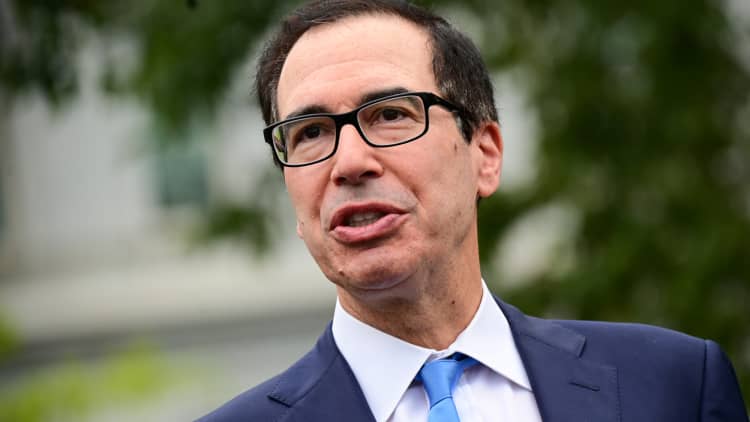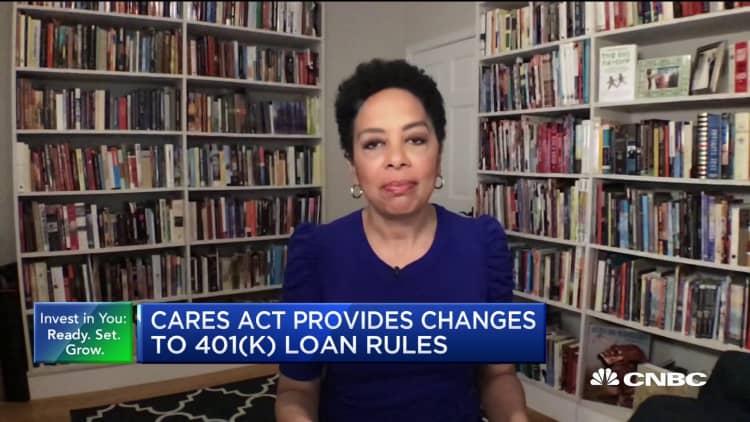Republicans do not plan to release a coronavirus relief bill until next week, but their proposal has mostly taken shape as Senate GOP leaders and the White House say they have reached a tentative deal.
Congress faces pressure to pass more legislation in the coming days to combat the damage from a raging outbreak. States will stop paying out the $600 per week enhanced federal unemployment benefit at the end of the week as the U.S. reports more than 4 million Covid-19 cases and at least 144,000 deaths from the disease.
As Senate Republicans and the Trump administration hammer out final details of a bill they previously hoped to release this week, provisions in the plan could change. Democrats, who passed their own relief package in the House in May, will look to reshape major parts of the GOP legislation.
Senate Republican leaders and White House negotiators outlined much, but not all, of what the proposal would include this week.
- It would extend enhanced federal unemployment insurance but "based on approximately 70% wage replacement," according to Treasury Secretary Steven Mnuchin. Senate Majority Leader Mitch McConnell, R-Ky., has described a continuation as "temporary." As of earlier this week, Republicans were considering paying out the supplemental aid through December, sources told CNBC.
- The plan would send another round of direct payments to Americans. It is unclear now if the bill would keep the same terms of eligibility as the stimulus checks approved in March ($1,200 to individuals and $2,400 to couples, which started to phase out at an average income of $75,000 per person and ended completely at an average income of $99,000). On Friday, McConnell said "we do envision another round of direct cash payments particularly those making $40,000 a year and less in the hospitality industry."
- It would protect businesses, doctors and universities from coronavirus-related lawsuits except for cases of "gross negligence and intentional misconduct," according to McConnell. He has described the provision as a "red line" in talks with Democrats.
- The legislation would include $105 billion to help schools restart, with at least part of the funding contingent on them opening their doors in the fall.
- The bill would authorize what Republicans have called a targeted second round of Paycheck Protection Program loans for small businesses hit particularly hard by the pandemic. Mnuchin said the aid could go to companies whose revenues have fallen more than 50%.
In addition to those pieces of the plan, Republicans have said their bill will include $16 billion in new funds for coronavirus testing and tax incentives to encourage companies to rehire workers and adopt safety measures.

GOP officials still need to come to a consensus among themselves even before Democrats join the discussions. On Thursday, McConnell said the Trump administration "has requested additional time to review the fine details."
Then on Friday, he said Republicans were developing a proposal they plan to release on Monday. After its release, "we'll be sitting down with the Democrats to see what we can agree to do going forward," he added.
Letting the extra unemployment benefit lapse even for a few weeks could have major ripple effects. The payments will end around the same time a federal moratorium on evictions does. The additional funds have not only helped the roughly 30 million people still getting some form of unemployment insurance cover food and housing costs, but also have boosted consumer spending at a time when many businesses are still closed.
Democrats have blamed Republicans throughout the week for the delays in passing new relief. In a joint statement Friday, House Speaker Nancy Pelosi, D-Calif., and Senate Minority Leader Chuck Schumer, D-N.Y., said "we had expected to be working throughout this weekend to find common ground on the next COVID response package."
"It is simply unacceptable that Republicans have had this entire time to reach consensus among themselves and continue to flail," they said. "Time is of the essence and lives are being lost."
McConnell said Thursday that when the GOP releases a bill, he hopes Democrats "meet our serious, fact-based proposal with the productive and bipartisan spirit that got us the CARES Act, rather than the cynical partisanship that led them to block" a Republican-written police reform proposal last month.
Democrats have signaled they will push Republicans to make changes on several major pieces of the plan. On Thursday, Pelosi said she will continue to call for extension of the $600 per week unemployment benefit at its current level.
She reiterated Friday that she would not agree to a short-term extension of the unemployment benefit while Congress negotiates a broader bill, saying she wants to pass a full relief package.
The bill that passed the House in May would extend it into January. Schumer previously signed on to a proposal that would automatically reduce the benefit as state unemployment rates fall below certain thresholds.
Pelosi and Schumer have also insisted on nearly $1 trillion in aid for states and municipalities as governments facing lost revenue and increased expenses during the pandemic consider laying off workers. National Governors Association Chair Larry Hogan, a Republican from Maryland, and Vice Chair Andrew Cuomo, a New York Democrat, have repeatedly called on Congress to approve at least $500 billion more in relief for states.
The GOP proposal would give states and municipalities more flexibility in how they spend aid approved earlier this year but would not authorize new money.
Democrats also want to include rent and mortgage assistance in the developing bill.



